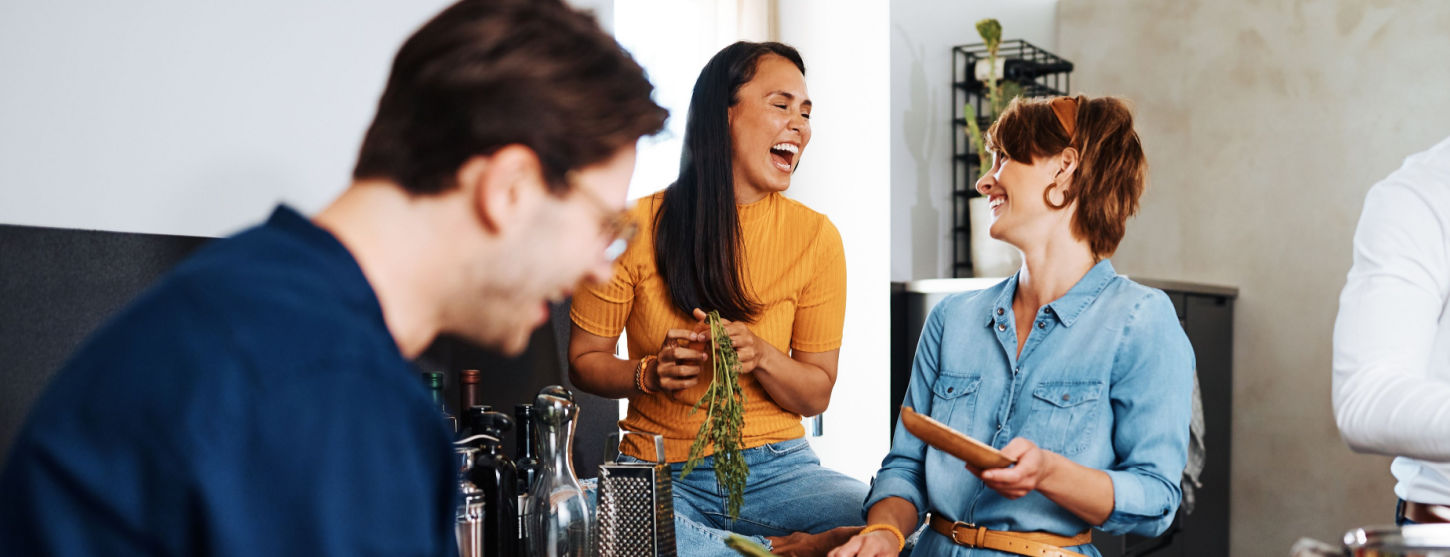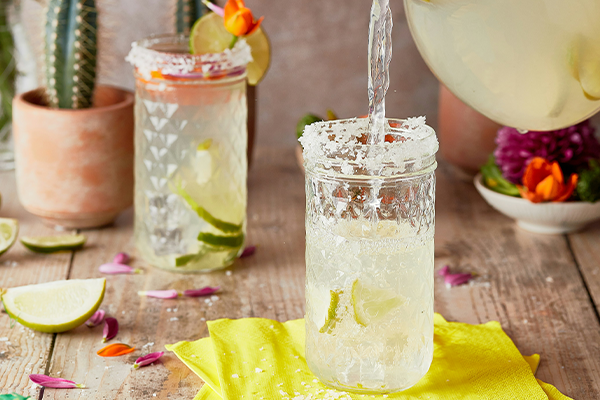15% off €30 or 20% off €40
Code:PICKME
The benefits of giving up alcohol

Explore the short- and long-term benefits of going sober including improved sleep quality, lower blood sugar, and weight loss.
Summary
1Short term benefits of quitting alcohol
1. Better relaxation and sleep 2. Healthier skin 3. More energy...
2Long-term benefits when you stop drinking alcohol
1. You might find it easier to manage your weight 2. You’ll save money 3. Lower risk of chronic illnesses...
3Don’t do it alone
A lot of people miss the ease of drinking. One or two might help the conversation flow, and it’s so ingrained into many of our cultures that you...
A drink now and then never hurt anyone - or so we all like to think. But being “sober curious” is more popular than ever as we learn more and more about the long-term risks of alcohol.
Whether you’re looking to challenge yourself, save money, or spare your partner from your snoring, giving up alcohol could improve your life beyond the morning after.
Short term benefits of quitting alcohol
1. Better relaxation and sleep
While a nightcap might help some of us nod off, alcohol actually disrupts your sleep cycle and quality of sleep.1 Alcohol is a depressant: it relaxes you, and you may initially fall asleep quickly. But then comes the “rebound”.
It’s believed that alcohol increases sleep apnoea episodes by about 25%.5 Over time, sleep apnoea can contribute to depression, raise your blood pressure, and dangerously affect your breathing.6
After a few hours asleep, you’ll start to become unsettled and you might have vivid, stressful dreams. Alcohol (at any level) significantly delays and reduces the Rapid Eye Movement (REM) stage of sleep.2
This is the type of sleep in which you process all of your learning and memories. So, without proper REM sleep, you might struggle to focus, take new information in, or you might be more forgetful than usual.
If you drink more than 14 units per week (that’s about 6 pints of beer, 6 medium glasses of wine, or 14 shots of spirits), you’ll likely wake up feeling like you’ve had no rest at all.3,4
It’s believed that alcohol increases sleep apnoea episodes by about 25%.5 Over time, sleep apnoea can contribute to depression, raise your blood pressure, and dangerously affect your breathing.6
Whether it’s because of disturbed REM, sleep apnoea, needing the toilet, or something else, it’s also likely you’ll wake up more during the night. Luckily, you’ll see improvements quickly when you cut down the drinks.
If you’re struggling to fall asleep without alcohol, practising good sleep hygiene can help you lay down healthy habits for a proper night’s rest.
Many people find that a sleep-friendly bedtime routine helps their brain unwind. Try settling down to a bath or a book and minimise distractions if you can.
You might also find a supplement helps you wind down after a long day. Try remedies containing L-theanine, an amino acid that’s commonly found in tea leaves. It’s known to help relaxation, focus, and sleep – so you’ll get all the calm of a nice cuppa without the caffeine buzz.7
Handpicked content: The importance of sleep
2. Healthier skin
Ever caught a glimpse of yourself after a heavy night? Alcohol is a diuretic, which means it promotes water loss through your urine. (That’s why it feels like you need the toilet all the time when you’re drinking - you actually do).8
Your skin is 64% water, so it’s no surprise that it suffers when you drink.9 Dehydrated skin looks dull and can be prone to wrinkles much earlier than healthy, hydrated skin. Cutting down on your alcohol intake means you won’t lose that precious water and you’re more likely to wake up looking fresh.
3. More energy
It goes without saying that better-quality sleep will help you feel more refreshed the following day. But there are other benefits of quitting alcohol which contribute to higher energy levels:
- You’re less likely to feel the “brain fog” of dehydration
- You might be less inclined to snack on simple carb-rich foods that make you sluggish
- No more stumbling home in the small hours! You can absolutely have fun on an alcohol-free night out - but your natural sleep cycle may kick in and help you get into bed on time
Long-term benefits when you stop drinking alcohol
1. You might find it easier to manage your weight
A lower weight isn’t necessarily a healthier weight - but cutting out alcohol can help us make smarter choices about the food we eat.
You might find you’re ready for a snack after your evening tipple, even if you’ve just had a meal. Or maybe you can’t resist the smell of 3am chips (you’re not the only one).
These are all fine in moderation, but the fatty, carby foods that alcohol makes us crave can lead to poor nutrition and potentially unhealthy weight gain over time.
Plus, your drinks may contain more calories than you think. Just one pint of beer contains about 10% of a woman’s recommended calorie intake and 12.5% of a man’s.10
Going sober can reduce the calories you drink and help curb hangover cravings.
2. You’ll save money
The average person spends £378 on alcohol every year. And if you’re a frequent partygoer or you love an evening glass of wine, it could be even more.
More and more of us are forced to cut costs at the moment, but see if you can put some of your savings towards a reward for your efforts.
Besides, you can still enjoy the atmosphere of a pub or party (if you’re comfortable) …just with a fresh head and a little extra change in your pocket.
3. Lower risk of chronic illnesses
Your brain, heart, liver, pancreas, and nervous system are all at risk if you drink too much over a long period.11
Drinking heavily also raises your cholesterol and blood pressure, both of which increase your risk of heart attacks and strokes.12
What’s more, alcohol misuse can exacerbate existing conditions and weaken your immune system, so you’re more likely to get unwell and stay unwell.
Managing your alcohol intake, or cutting it out altogether, is just another way to lead a healthy lifestyle and reduce your risk of life-altering illnesses.
Don’t do it alone
A lot of people miss the ease of drinking. One or two might help the conversation flow, and it’s so ingrained into many of our cultures that you might feel under pressure when you choose not to drink.
This can be a lot to deal with - not least because you’re facing things without your usual “liquid courage”.
If you’re just trying to quit casual drinking, it can help to have a purpose or a like-minded community behind you. Movements like Sober October and Dry January bring thousands of people together as they quit alcohol for the month.13,14
Anyone can sign up: you can do so “officially” (for example on the Dry January app) or just join in. According to the University of Sussex, 70% of people who sign up to Dry January are still drinking more healthily 6 months later.15
Sober October is run by Macmillan Cancer Support and encourages individuals or groups to raise money for the charity while they quit alcohol. It’s a great opportunity for people to take the plunge and reap the benefits of going sober, with a little extra motivation.
Not only does it help participants form a community while they go sober, but it raises vital funds for the UK’s largest cancer care charity.
Could you sign up to Sober October this month? What about your friend group or your workplace?
Please note that you should not attempt to stop drinking suddenly if you think you might be dependent on alcohol, as this can be very dangerous. Alcohol-free months are designed as a challenge or to help people re-evaluate their social drinking habits.
Please speak to your GP first if you think you may be dependent on alcohol.
The final say
As well as helping you challenge yourself, cutting down on alcohol could:
- Help you sleep better
- Hydrate your skin Improve your diet
- Give you a sense of achievement
- Save you money
- Lower your risk of serious illness

You could reduce or cut your drinking by:
- Finding alcohol-free swaps for your favourites
- Enjoying a “sober night out” with friends
- Raising money for charity in a movement like Dry January or Sober October
Handpicked content: Make your own mocktails
Sources
- https://www.sciencedirect.com/science/article/pii/S2352250X18302719?via%3Dihub
- https://onlinelibrary.wiley.com/doi/abs/10.1111/acer.12006
- https://www.drinkaware.co.uk/facts/alcoholic-drinks-and-units/what-is-an-alcohol-unit
- https://www.drinkaware.co.uk/facts/health-effects-of-alcohol/effects-on-the-body/alcohol-and-sleep
- https://www.sleeptest.co.uk/how-does-alcohol-affect-sleep-apnoea/
- https://www.nhs.uk/conditions/sleep-apnoea/
- https://www.psychologytoday.com/gb/blog/sleep-newzzz/201708/what-you-need-know-about-l-theanine
- https://www.drinkaware.co.uk/facts/health-effects-of-alcohol/effects-on-the-body/why-does-alcohol-make-you-pee-more#
- https://www.usgs.gov/special-topics/water-science-school/science/water-you-water-and-human-body
- https://www.drinkaware.co.uk/tools/unit-and-calorie-calculator
- https://www.cdc.gov/alcohol/fact-sheets/alcohol-use.htm#
- https://www.nhs.uk/conditions/alcohol-misuse/risks/
- https://alcoholchange.org.uk/help-and-support/managing-your-drinking/dry-january/about-dry-january/the-dry-january-story
- https://www.theguardian.com/lifeandstyle/2018/sep/17/alcohol-free-months-are-all-the-rage-but-will-a-sober-october-lead-to-long-term-health-benefits
- https://www.tandfonline.com/doi/abs/10.1080/08870446.2020.1743840?journalCode=gpsh20
Last updated: 7 October 2022
The advice in this article is for information only and should not replace medical care. Please check with your GP or healthcare professional before trying any supplements, treatments or remedies. Food supplements must not be used as a substitute for a varied and balanced diet and a healthy lifestyle.



